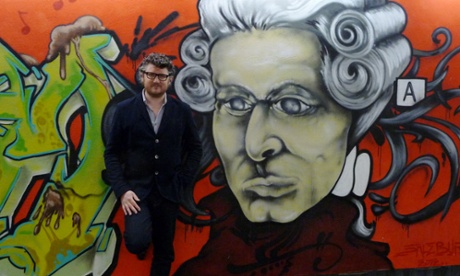
It turned out to be both the simplest and most complex question I could have asked: just why is it that Mozart’s music affects, moves, shatters, and delights us so much, even 224 years after his death? It’s something I’ve been asking for just as long as I’ve loved music, a love that began with Mozart when I was taken as a child to an all-Mozart programme by the Scottish Chamber Orchestra that transfixed, bewildered and completely bowled me over.
It’s my version of a question that we all want to answer, whether the music that defines your world is Madonna, Machaut, Marvin Gaye or Messiaen. But with Mozart there’s as much myth as there is reality when it comes to finding out who he was, and how and why he wrote the music he did. The more you look into it, the more it seems as if Mozart’s music is hidden in a hall of distorting mirrors, a labyrinthine illusion of stories, images, myths, and even merchandise that began to accrue to the man and his works immediately after his famously early death at the age of just 35 in 1791. Just think of Amadeus (the film of which was 30 years old last year) that magnificent concoction of facts but mostly fiction, with its looming presence of Salieri, the mediocrity who (didn’t, I promise!) murder Mozart: that’s just the the tip of the Mozart-myth-berg.
In their way, all of the stories about Wolfgang Amadeus (there’s one right there, by the way: Mozart never called himself “Amadeus”, but rather “Wolfgang Amadè”) - from the child prodigy who toured Europe for the epicurean delight of international aristocracy to the idiot-savant man-child of his later life whose life burnt brightly until it was extinguished by his attempt to compose a Requiem, which seemed to predict his own death and was left unfinished - are attempts to make sense of what seems otherwise to defy belief. If he wasn’t some kind of gift from God (another of the clichés), if Mozart wasn’t some kind of different being - a “genius” rather than simply a “bloke”, how is it possible to explain how he was able to compose the music he did, music that still speaks so powerfully to us today?
These last few months I’ve been making a film for the BBC about Mozart. And for me, the true Joy of Mozart is the discovery in our film that instead of occupying some other realm of existence, he was, in fact, as human, as flawed, as conflicted, and as compassionate as the rest of us. It’s just that he could express that humanity with unflinching honesty, tenderness, empathy, and apparent directness in his music, creating a world of feeling that’s as close to a sounding image of human consciousness as I think we have. As the violinist Paul Robertson tells me in the film, Mozart is “supernormal”: it’s not that he’s different from the rest of us, it’s rather that he is so uncannily like us that is truly astounding, even two-and-a-quarter centuries after his death.
At least, that’s how it seems to me - and to the contributors I talk to in the film, all of whom give new insights and illuminations into Mozart’s life and music and why it continues to matter today. It was both a thrill and a privilege to look at - and touch - Mozart’s original manuscripts with Cliff Eisen, to play his piano with Ulrich Leisinger in Salzburg, and to see the apartment where the string quartets dedicated to Haydn were first performed in Vienna. And through talking to some of his most inspirational interpreters, and hearing some of them play especially for us - conductors Jane Glover and John Eliot Gardiner, soprano Miah Persson, fortepianist Kristian Bezuidenhout, violinist Nicola Benedetti and viola player Lawrence Power - you’ll experience the powerful physicality of Mozart’s music, how it engages your mind, your body, and your whole being.
So is our Joy of Mozart the Joy of Mozart? Of course the film is, in a sense, simply another contribution to the countless stories that have been told about him. But you’ll catch, I hope, a glimpse of some fundamental qualities of Mozart’s music and his life. In taking him “off the plinth” (as I urge us to at the start of the film, standing beside the ludicrous excrescence of a sculpture of him in Vienna), I think Mozart becomes a more vitally contemporary figure. So forget the Mozart-balls - both those chocolatey transubstantiations of Mozartiana sold in vast quantities in Salzburg and Vienna, and the Mozart myths themselves - and confront the jaw-dropping achievement of Mozart’s music: its virtuosity of empathy and humanity. We might not have the complete response to that simplest but most profound of riddles - why does his music move us? - but we do have, I hope, an illuminating attempt at some answers. And thanks to our contributors, we go to places that I could never have predicted when I first posed that resonant question: from Mozart’s religious beliefs to his Enlightenment radicalism, from his relationship with instrumental technology to why he could have been the world’s most famous composer of music for video-games if he were alive today.
The Joy of Mozart is on BBC4 on 18 January at 9pm and on iPlayer for a month thereafter.

